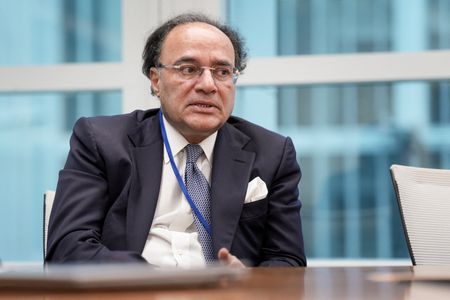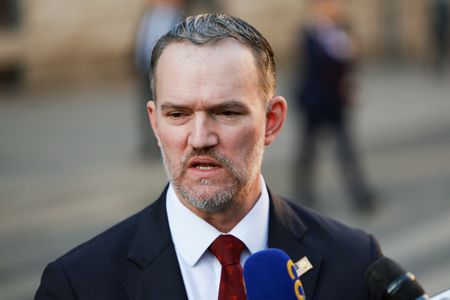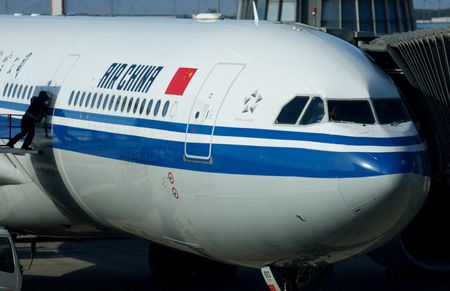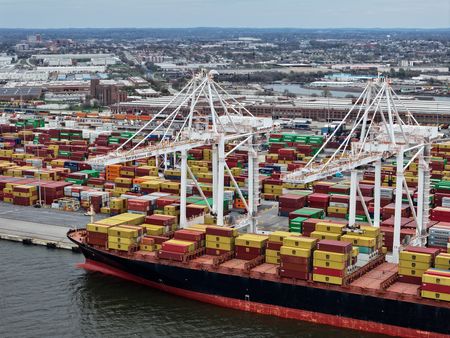By Karin Strohecker and Andrea Shalal
WASHINGTON (Reuters) -Pakistan is set to sign a preliminary deal on a review of its loan programme with the International Monetary Fund this week, the country’s finance minister said, a key step to securing another $1.24 billion payout from the lender.
An IMF team left Pakistan last week without signing so-called staff-level agreements on reviews of its two main support programmes which are worth a combined $8.4 billion.
“The mission was on the ground for a couple of weeks, we had very constructive dialogue with them around the quantitative benchmarks, the structural benchmarks, and we’ve been having some follow-up discussions,” Muhammad Aurangzeb told Reuters during an interview on the sidelines of the IMF and World Bank annual meetings.
“During the course of this week, we’re hoping that we can get the SLA done.”
RETURN TO CAPITAL MARKETS
Pakistan stocks closed 4% up after the news.
Countries under IMF lending programmes need to pass regular reviews, which, once signed off by the Fund’s executive board, trigger loan tranche payments.
The IMF support agreed in September 2024 helped shore up Pakistan’s $370 billion economy following a severe economic crisis that sent its currency tumbling.
Aurangzeb said the government now plans to return to capital markets, starting with its first green bond denominated in Chinese yuan before the end of the year, followed by an at least $1 billion international bond.
“Euro, dollar, Sukuk, Islam Sukuk – we’re keeping our options open,” he said.
Long-delayed state asset sales are also expected to gain traction now after disappointing progress last year.
Islamabad wants to sell off three power distribution companies and national flag carrier Pakistan International Airlines.
“We are quite hopeful,” Aurangzeb said about the planned airline sale, adding that lucrative reopened routes to Europe and Britain made it “a very good proposition.”
If it takes off it would be Pakistan’s first major privatisation in roughly two decades.
A deal collapsed last year after a single lowball offer, but the government has since drawn interest from five domestic business groups including Airblue, Lucky Cement, investment firm Arif Habib and military-backed Fauji Fertilizer.
Final bids are expected later this year. The government also hopes the privatisation of a yet to be named financial institution could move ahead this month.
MEETING WITH US OFFICIALS
Aurangzeb, who is expected to meet with U.S. Treasury Secretary Scott Bessent this week, said Pakistan was relieved to have ended up with a 19% U.S. tariff having originally braced for a 29% levy.
Discussions about U.S. investments in the country’s oil and gas and minerals and mining sectors are now taking place, he said, though he added it was early days.
Pakistan recently signed a memorandum of understanding with Reko Diq, run by mining firm Barrick Gold, for a first copper mine, with the overall project potentially growing to as much as $6.5 billion to $7 billion, Aurangzeb said.
“The potential of this sector is huge,” he said, citing growing demand due to the global energy transition away from fossil fuels.
Pakistan is also trying to maintain strong ties with China.
“I don’t quite frankly see it as an and-or discussion, it’s very much an and-and discussion for us,” he said, when asked whether Pakistan’s growing ties with Washington signalled a shift in its dealings with Beijing.
Asked whether Washington’s reluctance to fund climate change projects could hit Pakistan, Aurangzeb said the country was well-positioned to weather it, given a $1.3-billion Resilience and Sustainability facility with the IMF as well as a $2-billion World Bank programme, of which one-third is earmarked for climate change, and other programmes.
“I think there is enough (available funding) at this point in time that we can move forward with the adaptation agenda. The ball is in our court.”
(Reporting by Karin Strohecker; Editing by Sharon Singleton, Marc Jones and Emelia Sithole-Matarise)










